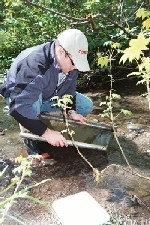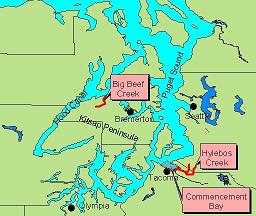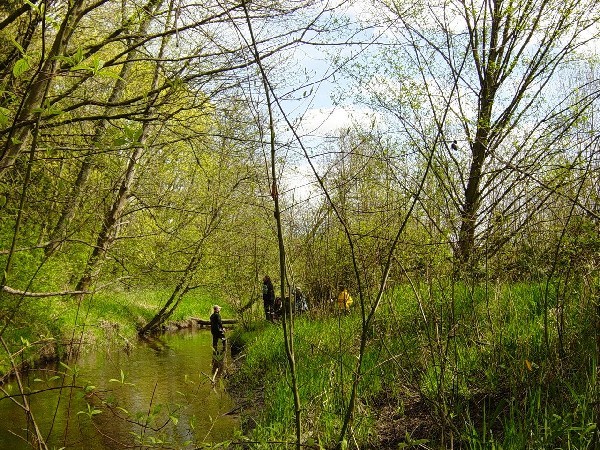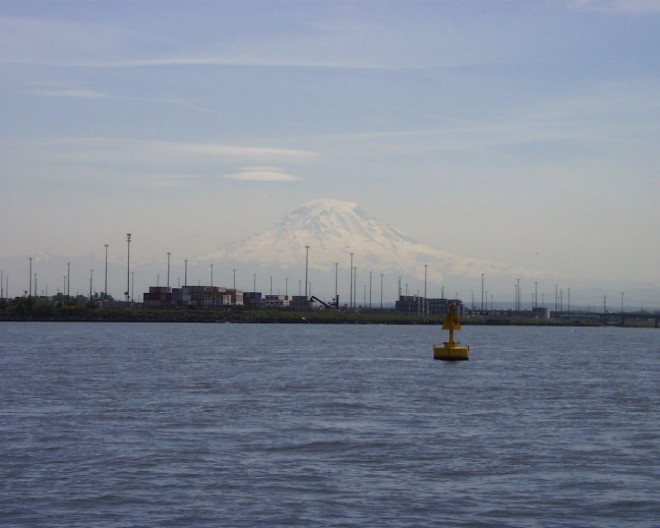 |
 |
 |
Map showing the areas sampled

Image courtesy of class of 2002 webpage
http://courses.washington.edu/uwtocean
Water Resources and Pollution (TESC 431) is an intensive field course that investigates the quality of watersheds and estuaries in Washington State. The class focuses on the physical, chemical and biological properties of various water sources and evaluates the availability and use of this limited global resource. The Hylebos Creek watershed, located in a heavily developed urban area between King and Pierce counties, is threatened due to impermeable surfaces that contribute to increased levels of nutrients and pollution runoff resulting in decreased salmon habitat and populations. The Big Beef Creek watershed is located in a rural area on the Kitsap peninsula and is threatened by the consequences of increasing human populations and agricultural runoff. Estuarine water samples were collected from Commencement Bay, located in Tacoma, Washington which is recovering from past heavy industrial use.
 |
 |
 |
Map showing the areas sampled

 The
Hylebos Creek watershed begins near the parking
lot of Seatac Mall and flows through industrial, commercial and residential
districts within the cities of Federal Way, Milton and Fife, Washington before
finally emptying into Commencement Bay. Between the headwaters in Federal Way
and the eventual outflow into Commencement Bay, the Hylebos Creek flows through
many lakes and retention ponds. The Hylebos Creek was surveyed, water samples
were collected and analyzed for nine locations.
The
Hylebos Creek watershed begins near the parking
lot of Seatac Mall and flows through industrial, commercial and residential
districts within the cities of Federal Way, Milton and Fife, Washington before
finally emptying into Commencement Bay. Between the headwaters in Federal Way
and the eventual outflow into Commencement Bay, the Hylebos Creek flows through
many lakes and retention ponds. The Hylebos Creek was surveyed, water samples
were collected and analyzed for nine locations.
 Increasing
residential development has led to an increase in land use near Big
Beef Creek located in Seabeck, Washington. The Big Beef Creek watershed
consists of an upper watershed and a lower watershed. The upper watershed includes
marshes, Lake Symington and several tributaries that flow into the creek. The
lower watershed is mostly forest and includes a large tide flat that empties
into Hood Canal. Regular stream monitoring by the University of Washington includes
temperature, pH, conductivity, dissolved oxygen, nitrate, total suspended solids,
ammonia, total nitrogen, total phosphorus, discharge rate, and macroinvertebrates.
Increasing
residential development has led to an increase in land use near Big
Beef Creek located in Seabeck, Washington. The Big Beef Creek watershed
consists of an upper watershed and a lower watershed. The upper watershed includes
marshes, Lake Symington and several tributaries that flow into the creek. The
lower watershed is mostly forest and includes a large tide flat that empties
into Hood Canal. Regular stream monitoring by the University of Washington includes
temperature, pH, conductivity, dissolved oxygen, nitrate, total suspended solids,
ammonia, total nitrogen, total phosphorus, discharge rate, and macroinvertebrates.
 Industries
positioned around Commencement Bay in south Puget
Sound, located in Tacoma, Washington, have severely impacted the quality of
water and habitats of many organisms. Several major waterways flow into the
bay including the Puyallup River and the Hylebos Creek. CTD measurements, water
samples and plankton were collected at several sites and returned to the lab
for analysis. This data was then compared to past sampling data to get a better
understanding of the health of the bay.
Industries
positioned around Commencement Bay in south Puget
Sound, located in Tacoma, Washington, have severely impacted the quality of
water and habitats of many organisms. Several major waterways flow into the
bay including the Puyallup River and the Hylebos Creek. CTD measurements, water
samples and plankton were collected at several sites and returned to the lab
for analysis. This data was then compared to past sampling data to get a better
understanding of the health of the bay.
2003 Field Team Members: Barb Tope, Michelle Massero, Jeff Elisoff, Debbie Bailey, Jason Hall, Sarah Ralph, Chris Ringstad, Joseph Brucklier, Deb McCunn., and Jayson Stevens. Special thanks to Dr. Cheryl Greengrove for the field experience and fun over the quarter.